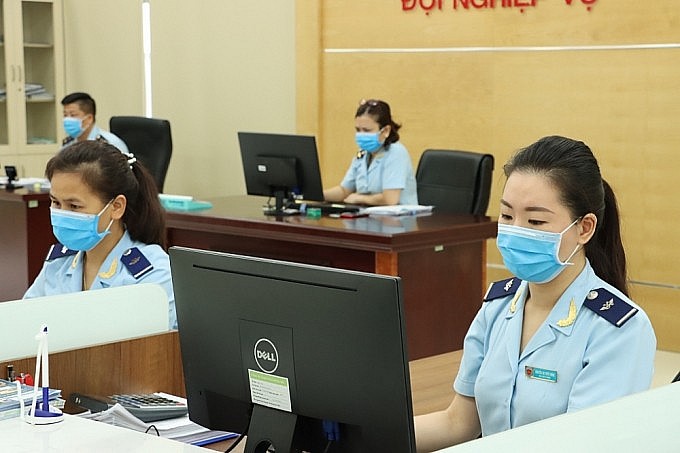| ||
Communicate and solve problems in a timely manner
According to the General Department of Customs, the whole industry will continue to implement the Government's resolutions, the Prime Minister's directives, and the Ministry of Finance on supporting businesses in the context of Covid-19, and solutions to urgently remove difficulties for businesses, ensuring customs clearance for import and export goods, list of duty-free items, self-certification documents submission, scanned C/O submission time to the customs data processing system...
The coordination with the People's Committees of provinces and cities in supporting customs activities in the area will also be strengthened. In the past year, this work has had a positive effect, especially at times when goods were congested at border gates, customs authorities have coordinated with departments, branches, People's Committees of provinces and cities having a common border with neighboring countries to constantly exchange information and meet to remove obstacles and speed up customs clearance. This not only created favorable conditions for businesses, but also ensured the state management of customs, prevention of smuggling and trade fraud.
In the coming time, the inspection of goods at storage locations will also be suspended for blockade areas until blockades are lifted and the information collection, risk assessment tasks are increased by relevant units to take timely handling measures in order to strictly manage the delivery of goods to storage locations.
In direct operations, the priority of pandemic prevention and control is placed on top, customs authorities continue to deploy various forms of support for enterprises. Specifically: arrange reception desks of enterprises separate from working areas of officials and civil servants, at the same time allocate civil servants to guide and receive original documents of enterprises, monitor and prepare the application receipt form to manage the original documents submitted and presented by the enterprise to prevent the loss of documents.
In the application-receiving area, the customs units have arranged screens for businesses to look up receiving officers; at the same time, deploying phone, Zalo numbers to response to businesses queries, phone numbers of officials receiving dossiers so that businesses can easily exchange information when necessary.
In addition, organize for civil servants to inspect customs clearance, liquidate documents at the scene, limit movement from the physical inspection site to the branch; shorten the time for customs clearance of goods; allocate addition customs officers to support and guide enterprises to carry out customs procedures. At the same time, receive error alerts by the port enterprise of ineligible for customs clearance declarations through the monitoring area provided to determine the cause and guide in a timely manner; arrange separate working rooms (fully equipped with pandemic prevention conditions) for cadres and civil servants to work with enterprises if necessary;...
Establish a friendly digital customs service environment
Looking further, according to Deputy Director of the General Department of Customs Mai Xuan Thanh, in the coming time, the Covid-19 pandemic will still have complicated developments, trade competition between major countries, the trend of shifting global supply chains, the 4.0 revolution... will affect our country's export and import activities. Vietnam Customs will continue to implement the policy of strengthening international integration, harmonizing the task of creating trade facilitation, while doing well the State management of customs, creating a transparent and fair import-export environment, contributing to improving national competitiveness.
One of the main solutions to realize the goal is to implement digital customs with preeminent features.
Digital Customs will assist smart border management because the border management model is integrated to reduce the requirement for direct participation of Customs officers, simplify administrative procedures, reduce waiting time at the border, carry out the distribution of goods, passengers and vehicles, and authorize inspection at the border gate.
Digital customs will also implement an integrate supply chain management model according to the guidance in the security and trade facilitation framework of the World Customs Organization. The administrative procedures of the relevant ministries and branches, the documents in the customs dossiers will be standardized, data digitized and implemented completely in an electronic, paperless environment; ensure high-level information security.
This system will establish a friendly, easy-to-access digital service environment, capable of meeting the needs of service use anytime, anywhere and on any means, flexible, and able to respond to changes in the digital environment. changes in regulations and policies, ensuring seamless, non-broken commercial activities.
In particular, smart connections and processing by applying new technological achievements, ensure customs authorities in automatically analyzing and processing information; mastering technology, promptly adapting to changes in the working environment; ready to integrate, connect and share information with stakeholders to serve management.
| Digital customs will promote simple and transparent administrative procedure reform The most important thing of the digital customs system is to help the Customs sector reform administrative procedures towards transparency, simplicity, and consistency, in line with the standards and recommendations of the World Customs Organization, ensuring goods are cleared, release quickly, reducing costs for businesses. Digital customs also encourages and creates conditions for people, businesses and related parties to participate in legal policy criticism, cooperate with customs authorities in law enforcement and supervision; actively and proactively consult and participate in solving problems and conflicts between the parties in the customs clearance of import and export goods. |





















































